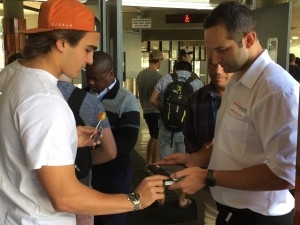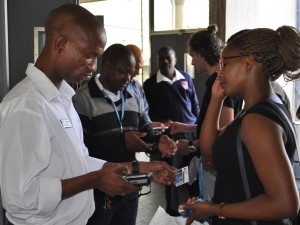
While there are many forms of academic cheating, perhaps one of the most difficult to detect is when a third party sits an examination for a registered student. This is prevalent in large tertiary educational facilities where lecturers do not necessarily know all the students attending their lectures.
Biometrics have been commonly used at primary and secondary school levels in the United States since 1997 and in the United Kingdom and Europe since the start of this century, to provide learners with access to library facilities and canteens, for example. More recently, tertiary educational facilities have adopted biometric verification to ensure that those sitting for examinations are matched with those actually registered for the examination.
According to John Powell, CEO of Powell Tronics, it is important to ensure that any biometric solution deployed to undertake this function is able to communicate with existing educational facility databases. This will obviate the need to cross reference data manually, not only saving time, but also ensuring high levels of accuracy.
Powell Tronics' PT-Rollcall is designed for use in education facilities and acts as an electronic replacement of manual examination rollcall registers. PT-Rollcall, a solution combining biometric fingerprint enrolment on an access control backbone and the education facility's examination system, allows exam invigilators to verify the student's identity using their biometric access information on portable Morpho biometric-enabled devices.
Through PT-Rollcall's integration, prior to each examination starting, the students are required to present their fingerprint in order to check-in at a particular examination venue. On successful identification of the fingerprint template, the student's details, including captured photograph, are displayed on the device for further visual verification by the invigilator. An adaption of the identification process has been included to cater for students with poor quality fingerprints using printed proximity cards with an indication pertaining to the biometric template quality.
PT-Rollcall has been designed in such a manner that it allows for some customisation to best suit the specific educational campus to ensure full compatibility and integration with the university's own student and access management systems. The combined information is uploaded and populated onto mobile biometric devices daily to ensure the most updated data is available at the start of each examination.
A number of South Africa's universities are recognising the benefits of a biometric registration system. Trialled during the mid-year 2015 tests and as a final proof of concept, implemented for the 2015 year-end examinations for a specified group of first year students, PT-Rollcall was used in conjunction with portable biometric terminals. The benefit of using mobile biometric devices are huge, especially in eliminating bottleneck situations for very large venues and giving invigilators, institutions and students the knowledge that all the boxes are ticked.

"As with all technology, the evolution drives the market in seeking the best solution for the job, resulting in ongoing development on the latest available portable/mobile hardware available. As a result we are currently customising the PT-Rollcall software to operate on Android devices that offer aesthetically pleasing usability and user interfaces. Further testing of the enhanced solution commenced at the beginning of November 2016 and the proof of concept will continue into the first quarter of 2017 to accommodate for the exam deferrals due to the recent student unrest," Powell points out.
Depending on which portable device is used, currently the maximum of up to 3 000 student templates can be encrypted and stored on each device, providing educational facilities with a quick and reliable way of conducting rollcall procedures.
Working in conjunction with the Powell Tronics system management application, Tiberinus, PT-Rollcall allows a seamless link between the access control database and the institution's own student exam database.
PT-Rollcall provides various management reports which will include comparison of the number of students expected to sit for the examination versus the actual number of students present. Other data will include images of the students, the names of invigilators and the venue. Again, customisation is a given and a full audit trail is provided on the software and processes on the mobile device.
"Added value to the obvious benefits of an electronic enrolment process are the elimination of third parties illegally writing examinations for registered students and ensuring that all present, including the invigilator, are indeed in the correct venue at the correct time for the correct examination," Powell concludes.
Share
Editorial contacts